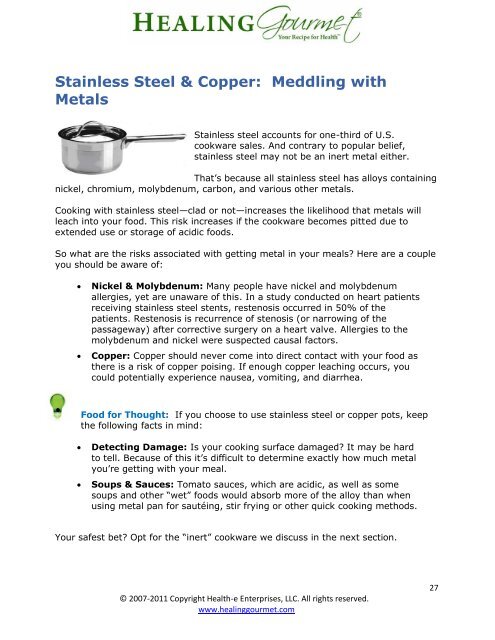Smart Cooks Age Better - The Food Cure: Your Healthy Eating ...
Smart Cooks Age Better - The Food Cure: Your Healthy Eating ...
Smart Cooks Age Better - The Food Cure: Your Healthy Eating ...
You also want an ePaper? Increase the reach of your titles
YUMPU automatically turns print PDFs into web optimized ePapers that Google loves.
Stainless Steel & Copper: Meddling with<br />
Metals<br />
Stainless steel accounts for one-third of U.S.<br />
cookware sales. And contrary to popular belief,<br />
stainless steel may not be an inert metal either.<br />
That’s because all stainless steel has alloys containing<br />
nickel, chromium, molybdenum, carbon, and various other metals.<br />
Cooking with stainless steel—clad or not—increases the likelihood that metals will<br />
leach into your food. This risk increases if the cookware becomes pitted due to<br />
extended use or storage of acidic foods.<br />
So what are the risks associated with getting metal in your meals Here are a couple<br />
you should be aware of:<br />
<br />
<br />
Nickel & Molybdenum: Many people have nickel and molybdenum<br />
allergies, yet are unaware of this. In a study conducted on heart patients<br />
receiving stainless steel stents, restenosis occurred in 50% of the<br />
patients. Restenosis is recurrence of stenosis (or narrowing of the<br />
passageway) after corrective surgery on a heart valve. Allergies to the<br />
molybdenum and nickel were suspected causal factors.<br />
Copper: Copper should never come into direct contact with your food as<br />
there is a risk of copper poising. If enough copper leaching occurs, you<br />
could potentially experience nausea, vomiting, and diarrhea.<br />
<strong>Food</strong> for Thought: If you choose to use stainless steel or copper pots, keep<br />
the following facts in mind:<br />
<br />
<br />
Detecting Damage: Is your cooking surface damaged It may be hard<br />
to tell. Because of this it’s difficult to determine exactly how much metal<br />
you’re getting with your meal.<br />
Soups & Sauces: Tomato sauces, which are acidic, as well as some<br />
soups and other ―wet‖ foods would absorb more of the alloy than when<br />
using metal pan for sautéing, stir frying or other quick cooking methods.<br />
<strong>Your</strong> safest bet Opt for the ―inert‖ cookware we discuss in the next section.<br />
© 2007-2011 Copyright Health-e Enterprises, LLC. All rights reserved.<br />
www.healinggourmet.com<br />
27




